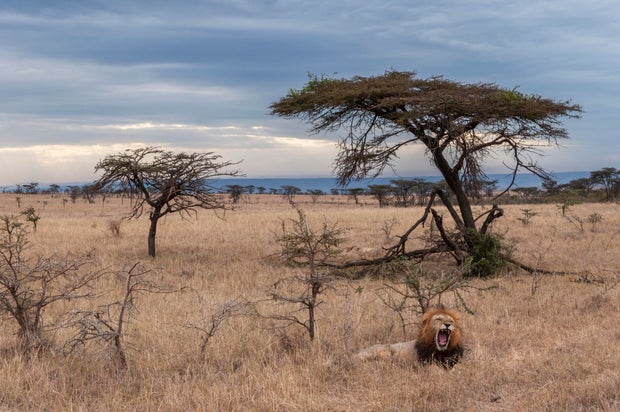A tiny invasive ant muscled right into a Kenyan savannah and sparked such a dramatic transformation within the panorama that even the native lions modified the way in which they hunt, in line with analysis revealed Thursday.
The research highlights the doubtless profound impacts of invasive species, that are spreading at an rising price as human actions give animals, bugs and vegetation alternatives to hitchhike into new territories.
“Oftentimes, we discover it is the little issues that rule the world,” mentioned Todd Palmer, an ecologist from the College of Florida, who was a part of the analysis crew that traced the implications of the big-headed ant on the searching habits of lions in central Kenya.
“These tiny invasive ants confirmed up perhaps 15 years in the past, and none of us observed as a result of they don’t seem to be aggressive towards huge critters, together with folks. We now see they’re reworking landscapes in very refined methods however with devastating results,” Palmer mentioned.
All of it begins with the whistling-thorn acacia bushes within the plains of Laikipia, Kenya.
Sergio Pitamitz/VWPics/Common Pictures Group through Getty Pictures
These thorny bushes had developed a mutually useful relationship with the native acacia ant: The bushes present shelter and meals for the ants and in return they use their stinging chew to discourage hungry elephants from devouring the bushes.
However the big-headed ant modified all that.
Thought to have originated on an island within the Indian Ocean and dropped at the world by the motion of individuals and items, these invasive marauders arrived round 20 years in the past and began killing the acacia ants, leaving the whistling-thorn bushes susceptible to herbivores.
Diminished tree cowl poses an issue for lions as a result of they depend on the component of shock to ambush their prey, notably zebras.
Researchers spent three years in Kenya’s Ol Pejeta Conservancy monitoring the lions’ actions with GPS collars to see how they responded within the areas colonized by the invasive ants.
Their research, revealed within the journal Science, discovered that the big-headed ants had led to a threefold decline in zebra killings.
“This research was a good looking snapshot of how sophisticated ecosystems may be — this concept that you just pull on a single thread and the entire system reacts,” mentioned Meredith Palmer, an ecologist who was not concerned within the research.
The researchers had been stunned to seek out that the ants’ impression didn’t trigger the lion inhabitants to say no — excellent news as a result of lion populations within the area have already shrunk to round 2,000 people from an estimated 100,000.
As an alternative, the large cats switched eating choice and technique — ganging up in bigger teams to go after buffalo, mentioned Douglas Kamaru of the College of Wyoming, lead writer of the research.
Whereas the lions have tailored to this point, the big-headed ants may spell bother for different species that depend on the whistling-thorn tree, like giraffes or the critically endangered black rhino.
“The query is what occurs going ahead,” Kamaru instructed Agence France-Presse.
And the lions’ altering food plan might provoke its personal cascade of impacts.
“We do not but know what may end result from this profound swap within the lions’ searching technique,” Palmer mentioned.
Final 12 months, the intergovernmental science advisory panel for the U.N. Conference on Biodiversity catalogued greater than 37,000 so-called alien species which have taken root — usually actually — removed from their locations of origin.
That quantity is trending sharply upward, together with the invoice for the injury, estimated at properly over $400 billion a 12 months.
Analysis has proven that local weather change has exacerbated the scenario. One research discovered that a minimum of a 3rd of recent introductions of invasive species within the final 200 years have occurred since 1970.
In November, a totally different research checked out how warming temperatures have modified the searching habits of cheetahs. Researchers discovered that the speedy cats — normally daytime hunters — shift their exercise towards daybreak and nightfall hours throughout hotter climate. That units them up for extra potential conflicts with principally nocturnal competing predators reminiscent of lions and leopards, the research mentioned.
